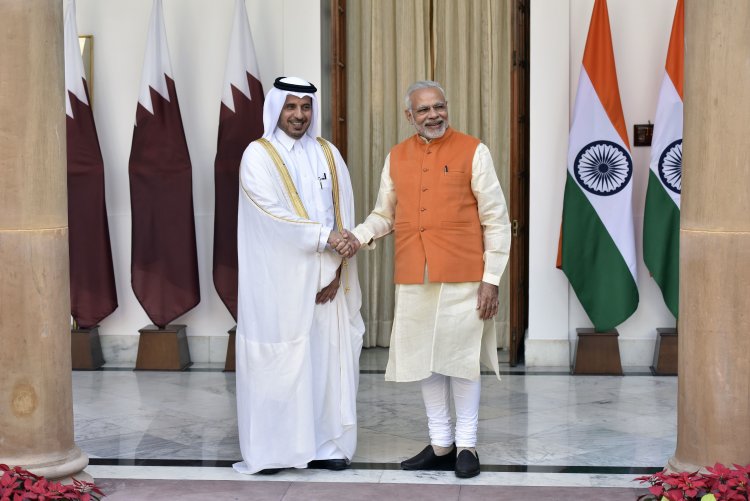India - Qatar: Test for India’s Diplomacy
STORIES, ANALYSES, EXPERT VIEWS

The death sentence pronounced on eight former officers of the Indian Navy by a Qatari court has shocked India. The government, writes K.C. Singh (secretary, MEA) “having intervened diplomatically earlier, seemed shell-shocked, perhaps having accepted Qatari advice to await the trial’s conclusion. The opacity, and often the vagaries, of the judicial processes in the Gulf nations should not have been ignored. The geopolitical fault-lines in the Gulf, as indeed the known predilections of the ruling Al Thani clan, should have been noted as other worrying elements.”
Shared origins of the Thanis of Qatar and the Sauds of Saudi Arabia: The Thanis of Qatar and the Sauds of Saudi Arabia are ruling families with shared origins in the Nejd interior, the font of ultra conservative Wahhabism. Former ruler Hamed bin Khalifa Al Thani even claimed, to the annoyance of the Saudis, that their family was related to Al Wahab, the founder of Wahhabism. “As Qatari wealth grew, especially after diversification into gas exports, these past rivalries worsened,” states Singh.
Qatar suspicious of BJP’s ‘special’ relations with UAE and Saudi Arabia ?
Into this regional situation “stepped the newly-elected BJP government in 2014. The development of ‘special’ relations with the rulers of the UAE and Saudi Arabia carried the risk that nations distrusting them may reassess their relations with India. Qatar had granted in 2010 citizenship to the iconic Indian artist M.F. Husain when he was living in Dubai in self-exile, threatened by far-right Indian groups. It also reacted strongly to the Islamophobic remarks by a BJP spokesperson.”
Qatar provided shelter to Islamist leaders: Qatar has provided shelter to all manner of Islamist leaders, including those of Hamas. It is now at the centre of the hostage negotiations in the Israel-Hamas standoff. Thus, “Qatar is not a small Gulf nation that can be cajoled or browbeaten. That Israel is being mentioned as the recipient of information allegedly passed by the former Navy officers facing the death penalty complicates the issue as strong anti-Israel feelings prevail in practically all Arab nations now.” But, “it seems highly improbable that all eight former Indian Navy officers could have conspired as a group. They are former mid-level naval officers who understand the implication of leaking classified information."
Pakistan angle
Singh notes “another dimension to the saga. Pakistan has bought MG-110 midget submarines from an Italian company called Cosmos. Qatar signed a memorandum of understanding (MoU) with Fincantieri SpA in 2020, another Italian company, for similar vessels. After Qatar was blockaded in 2017, it increased its reliance on Iran and Turkey.
“This new alliance of sorts has put Qatar in a camp that Israel views suspiciously. Even India would have been concerned about Pakistan's possible role.”
Complex geopolitical and region scenario
Indian diplomacy “is now facing a major test, as the charges are extremely serious and the geopolitical situation very complex….”
Aakar Patel (senior journalist and columnist writing for Asian Age) describes the complex regional situation thus: “The Indian government has abstained from calling for an end to the violence in the Gaza Strip in a UN General Assembly resolution in order to avoid upsetting the United States. India was told by the new Maldives leader to remove our soldiers from that country. Qatar sentenced eight Navy veterans to death. Sri Lanka allowed a Chinese spy ship to dock in Colombo despite India's objections. Bhutan has said it was about to conclude boundary negotiations with China, including on Doklam. Nepal cannot use its new Gautam Buddha airport because India doesn’t allow overflight of large planes. Canada has said it would not be able to normalise visas for Indians till 2024. These things have happened in the space of a few days.
“All South Asian nations except India voted to end the violence in Gaza, including Nepal, Sri Lanka and Bhutan, which traditionally votes with India. The 70 Indian military personnel in the Maldives who will now return maintain radar stations and surveillance aircraft, and Indian warships help patrol the Maldives’ exclusive economic zone. The reason we have been told to go is that the Maldives wants to favour China.”
















